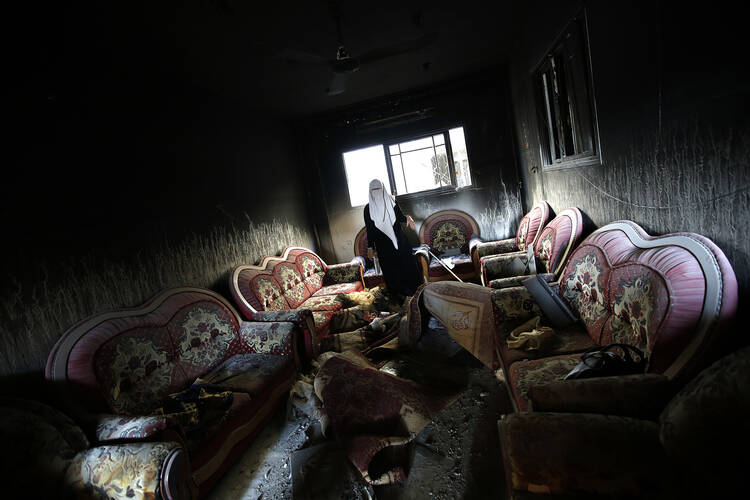Israel-Gaza still smolders. The op-ed pages, news stories and recent books still argue about the outcome of the war. Some even suggest that Gaza, with its 2000 dead, has won because it withstood Israel’s overwhelming land and air attack. Other commentators toy with despair because peace seems nowhere on the horizon.
Roger Cohen (New York Times, Oct 7) reports that as he prayed in a Reform synagogue at the High Holy Days in London, the rabbis did not address the 70 Israeli and 2000 Palestinians, including 500 children, dead. “The death of a single child to an Israeli bullet seems to betoken some failure in the longed-for Jewish state, to say nothing of several hundred.” He goes on to say, “The terrible thing about the Holy Land Today is the denial of this humanity to the stranger.” He does not mention, but he must know, the parable of the good Samaritan who nurses the robbed and beaten stranger on the road to Jerusalem. It was a plea in another context that the Jew and the stranger are dependent on one another. Cohen recalls that through history the Jews were the “community of expulsion... without a land to go to.” Today they cannot see that the Palestinians are the “community of expulsion,” expelled by them.
Shlomo Sand
Over the weekend I read a strange, but challenging book, Shlomo Sand’s How I Stopped Being A Jew (Verso). Sand is a University of Tel Aviv history professor, born of a Jewish mother and Gentile father in a displaced persons camp in Austria right after World War II. Though raised and educated as a Jew, Sand feels he must cut free of his origins because he is an atheist and does not embrace any of the Jewish traditions that re-enforce identity. Indeed he decries the situation of secular Jews who go through the motions of circumcision, Hanuka, etc but believe none of the historical traditions allegedly the basis of the celebrations. Secular Judaism, he argues, is empty if it is based on rituals that are not valid.
Nevertheless, he says, many of Israel’s Zionists founders selectively embraced Old Testament traditions that justified their occupation of Palestine without embracing the Bible’s religious beliefs. Once the Israeli population grew, fed by immigrants from all over Europe, especially Russia, the question of identity became harder to answer. In the end it’s all in your mother’s bloodstream. To legally be made a Jew without that qualification is a long and difficult process, he says.
Personally, I think of St. Ignatius’ reported statement that he wished he had Jewish blood in his veins because that’s what Jesus had. To have Jewish blood is an honor and a privilege; and if Sand reads this I’d urge him to read Genesis, the Prophets and the Psalms to discover enough inspiration on which to build some level of religious commitment. He is enraged that being a Jewish citizen in practice means “being a privileged citizen,” who can buy land non-Jews don’t have access to, be a minister of foreign affairs and live in a settlement outside the legal borders of the state, establish a colony on land you do not own, drive on highways where non-Jews may not, and you will not see your house demolished by mistake.
Patricia Greenfield
Patricia Marks Greenfield, a psychology professor from the University of California at Los Angeles, proposes “An Israel equal for all, Jewish or not,” (Washington Post, Sept 28). It’s the “one state solution,” which keeps popping up and which I would like to live long enough to witness. She returns from a research project with Jewish and Muslim scholars at Ben Gurion University in Beersheba, visiting all of Israel’s ethnic groups with two conclusions: Israel as a multiethnic society must provide equal legal and day-to-day treatment to all its citizens. In this Israel is out of step with the rest of the world. Other populations have become more ethnically and religiously diverse, more urban and educated, and their economies more commercial. They have left behind the notion of a favored state religion. Israel must become a fully secular state, she concludes. Gaza and the West Bank must inevitably become part of Israel, as Israel gives up official Jewish identity to become a multi-religous state with equal treatment for all.
Israel need not fear being overwhelmed by the Palestinian birth rate because, with equal education and economic opportunity, the Palestinian birthrate with even off with Israel’s, and the “right of return” would come to mean an opportunity to live in Israel as equal citizens. There’s one word for this: it is “peace."








